Core Faculty
Penn's brainSTIM Center is made up of a core faculty of neuroscientists, neurologists, psychiatrists, psychologists, and engineers from across the Perelman School of Medicine and the University of Pennsylvania. These unparalleled researchers and clinicians are focused on understanding the complex organization of the brain and harnessing its ability to reorganize in the setting of disease. Armed with this knowledge, center faculty apply their diverse skills and expertise to the science of neuromodulation with the eventual goal of reversing the symptoms of some of the most common, debilitating disorders of the brain.
To read browse our Center Highlight archive, click here.
- Roy Hamilton, MD, MS, Director
- Desmond Oathes, PhD, Co-Director
- Nick Balderston, PhD
- Michael Beauchamp, PhD
- Iahn Cajigas, MD, PhD
- Branch Coslett, MD
- Mario Cristancho, MD
- Casey H. Halpern, MD
- Sudha Kessler, MD, MSCE
- John D. Medaglia, PhD
- Katherine Scangos, MD, PhD
- Yvette Sheline MD, MS
- Flavia Vitale, PhD
Roy Hamilton, MD, MS, Director
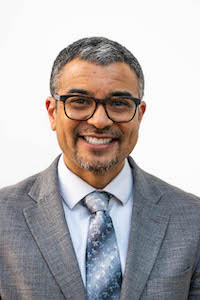 Roy Hamilton, MD, MS, is a board certified neurologist and practicing clinician at the Penn Memory Center. He is also a Professor in the departments of Neurology and Physical Medicine Rehabilitation at the University of Pennsylvania. Dr. Hamilton is the Director of Penn's Laboratory for Cognition and Neural Stimulation (LCNS), and is also the Director of the Brain Science, Translation, Innovation and Modulation Center (brainSTIM).
Roy Hamilton, MD, MS, is a board certified neurologist and practicing clinician at the Penn Memory Center. He is also a Professor in the departments of Neurology and Physical Medicine Rehabilitation at the University of Pennsylvania. Dr. Hamilton is the Director of Penn's Laboratory for Cognition and Neural Stimulation (LCNS), and is also the Director of the Brain Science, Translation, Innovation and Modulation Center (brainSTIM).
The central focus of Dr. Hamilton's research revolves around using noninvasive electrical and magnetic brain stimulation to explore the characteristics and limits of functional plasticity in the intact and injured human brain. He treats patients with Alzheimer's disease and other neurodegenerative disorders, in addition to patients with cognitive disorders relating to stroke or brain injury. Dr. Hamilton strives to advance the understanding of noninvasive neuromodulation in the fields of neurology, cognitive neuroscience, and neurorehabilitation.
Check out - Behind the CV: Roy Hamilton, MD, presented by MindCORE
https://www.youtube.com/watch?v=zknJftiOwoc
Desmond Oathes, PhD, Co-Director
 Desmond Oathes is a licensed clinical psychologist (CA) and an Associate Professor in the Department of Psychiatry at the University of Pennsylvania. He has secondary faculty appointments in Neuroscience, Neurosurgery, Neurology and Bioengineering. Dr. Oathes is Director of the Center for Brain Imaging and Stimulation (CBIS), Associate Director of the Center for Neuromodulation in Depression and Stress (CNDS) and Co-Director of the Brain Science, Translation, Innovation, and Modulation Center (brainSTIM) at Penn. His research leverages cutting edge neuroimaging-guided brain stimulation for interrogating and manipulating brain networks, especially those involved in neuropsychiatric conditions. His lab pursues concurrent TMS/fMRI methods development research with broad applications to cognitive and affective systems. Current projects are designed to improve depression, generally, as well as worry and depressive rumination symptoms, specifically.
Desmond Oathes is a licensed clinical psychologist (CA) and an Associate Professor in the Department of Psychiatry at the University of Pennsylvania. He has secondary faculty appointments in Neuroscience, Neurosurgery, Neurology and Bioengineering. Dr. Oathes is Director of the Center for Brain Imaging and Stimulation (CBIS), Associate Director of the Center for Neuromodulation in Depression and Stress (CNDS) and Co-Director of the Brain Science, Translation, Innovation, and Modulation Center (brainSTIM) at Penn. His research leverages cutting edge neuroimaging-guided brain stimulation for interrogating and manipulating brain networks, especially those involved in neuropsychiatric conditions. His lab pursues concurrent TMS/fMRI methods development research with broad applications to cognitive and affective systems. Current projects are designed to improve depression, generally, as well as worry and depressive rumination symptoms, specifically.
Nick Balderston, PhD
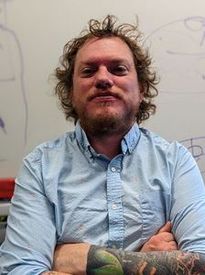
Nick Balderston, PhD, is an Assistant Professor of Psychiatry and Associate Director of the Center for Neuromodulation in Depression and Stress (CNDS) at the University of Pennsylvania. The overall focus of his lab is to understand the underlying causes of anxiety and to use this basic understanding to help develop and improve the tools that we use to treat anxiety disorders. His approach is to use psychophysiology and neuroimaging to develop hypotheses about how the brain and behavior are connected and then to test these hypotheses using causal noninvasive neuromodulation approaches, specifically transcranial magnetic stimulation (TMS). Dr. Balderston also organizes brainSTIM's yearly Intensive 3-Day TMS Workshop.
Michael Beauchamp, PhD
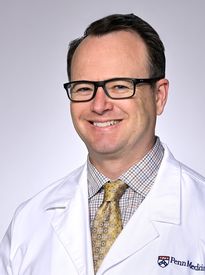 Michael Beauchamp is the Vice Chair for Research and a Professor in the Department of Neurosurgery. He is leading the effort to promote translational systems neuroscience research in the Department. In his own research program, he studies multisensory speech perception, the neural processes through which humans combine auditory information from the talker's voice with visual information from the talker's face. The importance of this process has been highlighted by the pandemic: mask-wearing muffles the voice while obscuring the mouth area, the most informative part of the face for social cues as well as speech content.
Michael Beauchamp is the Vice Chair for Research and a Professor in the Department of Neurosurgery. He is leading the effort to promote translational systems neuroscience research in the Department. In his own research program, he studies multisensory speech perception, the neural processes through which humans combine auditory information from the talker's voice with visual information from the talker's face. The importance of this process has been highlighted by the pandemic: mask-wearing muffles the voice while obscuring the mouth area, the most informative part of the face for social cues as well as speech content.
Iahn Cajigas, MD, PhD
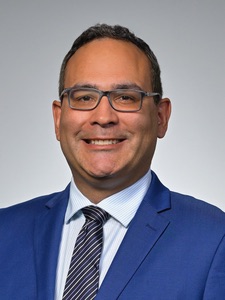 Dr. Iahn Cajigas is an Assistant Professor in the Department of Neurosurgery. He is a MD-PhD graduate of the joint Harvard-MIT program in health sciences and technology, Dr. Iahn Cajigas completed a residency in neurological surgery at the University of Miami/Jackson Memorial Hospital followed by a postgraduate fellowship in epilepsy, functional and stereotactic neurosurgery at the University of California, San Francisco. Dr. Cajigas’ clinical expertise includes deep brain stimulation, focused ultrasound, and stereotactic neurosurgery, the surgical management of epilepsy, the management of refractory pain with neuromodulation, and the surgical/radiosurgical treatment of trigeminal neuralgia.
Dr. Iahn Cajigas is an Assistant Professor in the Department of Neurosurgery. He is a MD-PhD graduate of the joint Harvard-MIT program in health sciences and technology, Dr. Iahn Cajigas completed a residency in neurological surgery at the University of Miami/Jackson Memorial Hospital followed by a postgraduate fellowship in epilepsy, functional and stereotactic neurosurgery at the University of California, San Francisco. Dr. Cajigas’ clinical expertise includes deep brain stimulation, focused ultrasound, and stereotactic neurosurgery, the surgical management of epilepsy, the management of refractory pain with neuromodulation, and the surgical/radiosurgical treatment of trigeminal neuralgia.
Branch Coslett, MD
 Branch Coslett is a Professor in the Department of Neurology and a Cognitive/Behavioral Neurologist with more than 30 years of experience in cognitive neuroscience research. His work has employed a number of methods including theoretically motivated investigations of subjects with brain disorders, non-invasive brain stimulation with Transcranial Magnetic Stimulation (TMS) in normal subjects as well as patients with stroke, transcranial Direct Current Stimulation (tDCS), functional neuroimaging and virtual reality. Dr. Coslett's clinical efforts focuses on patients with cognitive/behavioral disorders from stroke and traumatic brain injury as well as neurodegenerative diseases. His work spans several domains, including the neural basis and clinical implications of deficits affecting the brain's representations of the body, human spatial cognition, language processing, reading, semantic memory, and chronic pain.
Branch Coslett is a Professor in the Department of Neurology and a Cognitive/Behavioral Neurologist with more than 30 years of experience in cognitive neuroscience research. His work has employed a number of methods including theoretically motivated investigations of subjects with brain disorders, non-invasive brain stimulation with Transcranial Magnetic Stimulation (TMS) in normal subjects as well as patients with stroke, transcranial Direct Current Stimulation (tDCS), functional neuroimaging and virtual reality. Dr. Coslett's clinical efforts focuses on patients with cognitive/behavioral disorders from stroke and traumatic brain injury as well as neurodegenerative diseases. His work spans several domains, including the neural basis and clinical implications of deficits affecting the brain's representations of the body, human spatial cognition, language processing, reading, semantic memory, and chronic pain.
Mario Cristancho, MD
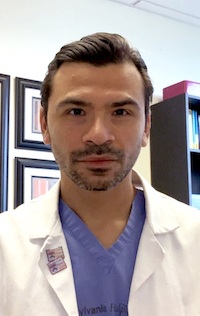
Mario Cristancho is an Associate Professor of Clinical Psychiatry in the Department of Psychiatry. Dr. Cristancho’s clinical focus is in the area of mood disorders particularly treatment resistant depression. He specializes in the use of psychopharmacology and neuromodulation interventions including Transcranial Magnetic Stimulation (TMS), Vagus Nerve Stimulation (VNS), Deep Brain Stimulation (DBS), and electroconvulsive Therapy (ECT). His clinical and research activities include the assessment and treatment of mood and anxiety disorders, optimization of existing treatments, and development of new therapeutic options. He has co-authored over 20 manuscripts and projects including peer reviewed papers and book chapters in mood disorders and neuromodulation.
Dr. Cristancho is the director of the Transcranial Magnetic Stimulation and Neuromodulation Program at Penn Psychiatry as well as the Medical Director of the Outpatient Psychiatry services. He is also involved in the supervision, teaching, and mentoring of medical students, psychiatry residents, and fellows in mood disorders.
Casey H. Halpern, MD
Casey  H. Halpern is an Associate Professor of Neurosurgery and Director of Stereotactic and Functional Neurosurgery at the University of Pennsylvania. Dr. Halpern's clinical focus is in the treatment of movement disorders such as Parkinson's, tremor, dystonia, and Tourette, as well as epilepsy, and psychiatric disease. He has a particular interest in preclinical studies and developing clinical trials to expand indications for deep brain stimulation and other novel brain surgical therapies. He is examining the role of targeting the reward circuitry of the brain with focused electrical stimulation, studies that could lead to possible treatment of neurologic and psychiatric conditions as well as obesity.
H. Halpern is an Associate Professor of Neurosurgery and Director of Stereotactic and Functional Neurosurgery at the University of Pennsylvania. Dr. Halpern's clinical focus is in the treatment of movement disorders such as Parkinson's, tremor, dystonia, and Tourette, as well as epilepsy, and psychiatric disease. He has a particular interest in preclinical studies and developing clinical trials to expand indications for deep brain stimulation and other novel brain surgical therapies. He is examining the role of targeting the reward circuitry of the brain with focused electrical stimulation, studies that could lead to possible treatment of neurologic and psychiatric conditions as well as obesity.
Sudha Kessler, MD, MSCE
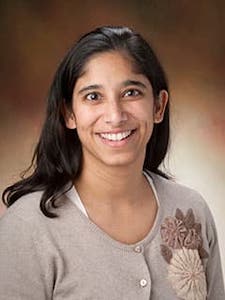 Sudha Kessler is an Associate Professsor of Neurology and is a board-cerfitied Pediatric Neurologist . Dr. Kessler is interested in the epileptic mechanisms of the human brain, specifically in children and the effect that transcranial magnetic stimulation has on those neural processes.
Sudha Kessler is an Associate Professsor of Neurology and is a board-cerfitied Pediatric Neurologist . Dr. Kessler is interested in the epileptic mechanisms of the human brain, specifically in children and the effect that transcranial magnetic stimulation has on those neural processes.
John D. Medaglia, PhD
 John Medaglia is an Associate Professor of Psychology and Neurology at Drexel University and an Adjunct Assistant Professor of Neurology at the University of Pennsylvania, where he is a Co-Principal Investigator in the Laboratory for Cognition and Neural Stimulation. His primary research interests are how to improve cognitive control in health and disease using multimodal neuroimaging, neuromodulation, and network neuroscience. In recognition of his work, Dr. Medaglia has received the NIH Director’s Early Independence Award, was named a "Rising Star" by the Association for Psychological Science, and was selected as a Fellow of the Psychonomic Society. Dr. Medaglia’s work has been funded by the NIH Office of the Director, National Institute of Neurological Disorders and Stroke (NINDS), National Institute of Mental Health (NIMH), and the Perelman School of Medicine at the University of Pennsylvania.
John Medaglia is an Associate Professor of Psychology and Neurology at Drexel University and an Adjunct Assistant Professor of Neurology at the University of Pennsylvania, where he is a Co-Principal Investigator in the Laboratory for Cognition and Neural Stimulation. His primary research interests are how to improve cognitive control in health and disease using multimodal neuroimaging, neuromodulation, and network neuroscience. In recognition of his work, Dr. Medaglia has received the NIH Director’s Early Independence Award, was named a "Rising Star" by the Association for Psychological Science, and was selected as a Fellow of the Psychonomic Society. Dr. Medaglia’s work has been funded by the NIH Office of the Director, National Institute of Neurological Disorders and Stroke (NINDS), National Institute of Mental Health (NIMH), and the Perelman School of Medicine at the University of Pennsylvania.
Katherine Scangos, MD, PhD
 Katherine Scangos, MD, PhD, is an Associate Professor CE of Psychiatry and Neurosurgery at the University of Pennsylvania and serves as the Director of the Brain Circuit Therapeutics Clinic and an Attending Physician in the Neuromodulation Service. Her clinical work focuses on interventional approaches, including transcranial magnetic stimulation (TMS) and deep brain stimulation (DBS), to treat treatment-resistant depression, obsessive-compulsive disorder, and psychiatric conditions associated with movement disorders. Dr. Scangos’s research combines advanced neuroimaging and neuromodulation techniques, such as DBS and low intensity focused ultrasound, to deepen our understanding of psychiatric disorders and develop innovative treatments. She is particularly interested in identifying neural biomarkers and developing personalized, circuit-based interventions for psychiatric disorders.
Katherine Scangos, MD, PhD, is an Associate Professor CE of Psychiatry and Neurosurgery at the University of Pennsylvania and serves as the Director of the Brain Circuit Therapeutics Clinic and an Attending Physician in the Neuromodulation Service. Her clinical work focuses on interventional approaches, including transcranial magnetic stimulation (TMS) and deep brain stimulation (DBS), to treat treatment-resistant depression, obsessive-compulsive disorder, and psychiatric conditions associated with movement disorders. Dr. Scangos’s research combines advanced neuroimaging and neuromodulation techniques, such as DBS and low intensity focused ultrasound, to deepen our understanding of psychiatric disorders and develop innovative treatments. She is particularly interested in identifying neural biomarkers and developing personalized, circuit-based interventions for psychiatric disorders.
Yvette Sheline MD, MS
 Yvette Sheline, MD, MS, is a McLure Professor of Psychiatry, Radiology and Neurology and the Director of the Center for Neuromodulation in Depression and Stress and Director, Section on Mood, Anxiety and Trauma. She has devoted her career to understanding the brain mechanisms of treatment effects and plasticity in depression and dimensional aspects of mood dysregulation across disorders. Her lab uses innovative neuroimaging methods to interrogate brain networks that are involved in affective illness and to develop individualized brain-based treatments targeting these networks using real time fMRI, cognitive behavioral therapy, novel pharmacotherapy, vagus nerve stimulation and TMS. In addition she directs a T32 post-doctoral program Integrative Training in the Neurocircuitry of Affective Disorders.
Yvette Sheline, MD, MS, is a McLure Professor of Psychiatry, Radiology and Neurology and the Director of the Center for Neuromodulation in Depression and Stress and Director, Section on Mood, Anxiety and Trauma. She has devoted her career to understanding the brain mechanisms of treatment effects and plasticity in depression and dimensional aspects of mood dysregulation across disorders. Her lab uses innovative neuroimaging methods to interrogate brain networks that are involved in affective illness and to develop individualized brain-based treatments targeting these networks using real time fMRI, cognitive behavioral therapy, novel pharmacotherapy, vagus nerve stimulation and TMS. In addition she directs a T32 post-doctoral program Integrative Training in the Neurocircuitry of Affective Disorders.
Flavia Vitale, PhD
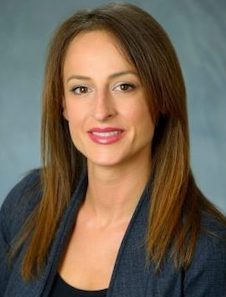 Flavia Vitale is an Associate Professor of Neurology, Bioengineering and Physical Medicine and Rehabilitation at the University of Pennsylvania. Her lab designs and develops of novel bioelectronic interfaces for studying, monitoring and treating disorders of the nervous and neuromuscular systems. Dr. Vitale’s research work focuses on engineering the electrochemical, mechanical and optical properties of nanostructured carbon materials and integrating them in soft, multimodal bioelectronic interfaces for recording and stimulation at high spatio-temporal resolution and at multiple scales, from individual cells to large-scale circuits. Some of the technologies developed in Dr. Vitale's lab include high-resolution, dry EEG sensors, implantable microelectrode arrays for neural recording and stimulation at single-neuron level, and soft micro-LED arrays for optogenetic neuromodulation. The ultimate goal of Dr. Vitale’s lab is to translate their research findings and technologies to patient care.
Flavia Vitale is an Associate Professor of Neurology, Bioengineering and Physical Medicine and Rehabilitation at the University of Pennsylvania. Her lab designs and develops of novel bioelectronic interfaces for studying, monitoring and treating disorders of the nervous and neuromuscular systems. Dr. Vitale’s research work focuses on engineering the electrochemical, mechanical and optical properties of nanostructured carbon materials and integrating them in soft, multimodal bioelectronic interfaces for recording and stimulation at high spatio-temporal resolution and at multiple scales, from individual cells to large-scale circuits. Some of the technologies developed in Dr. Vitale's lab include high-resolution, dry EEG sensors, implantable microelectrode arrays for neural recording and stimulation at single-neuron level, and soft micro-LED arrays for optogenetic neuromodulation. The ultimate goal of Dr. Vitale’s lab is to translate their research findings and technologies to patient care.

